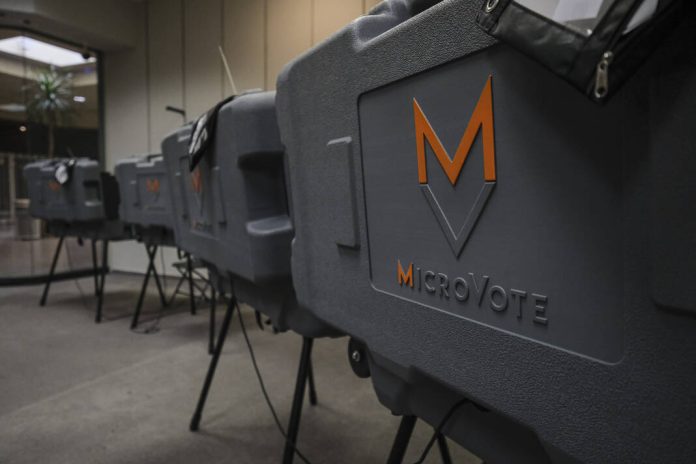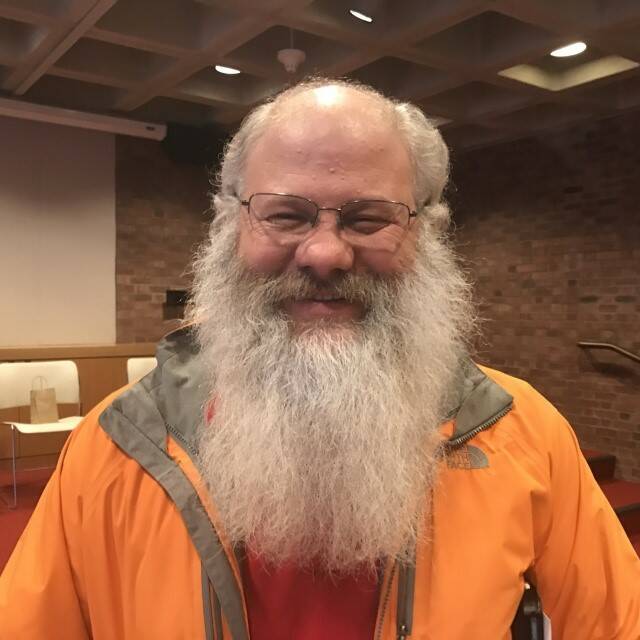An unusually number of changes in the makeup of the Bartholomew County Council will take place next year.
All three incumbent at-large council members have decided not to seek reelection. Republicans Evelyn Pence, Bill Lentz and Matt Miller have not elaborated on their reasons for stepping down.
However, four other Republicans campaigning to take their seats each believe they have unique qualifications to become decision-makers regarding county government’s fiscal affairs.
Candidates seeking the GOP nomination for council are:
Michael Bell, 55, the chief financial officer of Tallman Equipment, Columbus, who has served in township government for eight years.
Kim Bennett, 49, a treasury management officer with German American Bank who has served on the board of directors at four local nonprofit organizations.
John Prohaska, 55, a manager at Cummins, Inc. who currently serves on two government organizations that includes the Bartholomew County Plan Commission. He has also served leadership roles with four other nonprofits in the past.
Marcus Speer, 50, a self-employed farmer and minister who helps to handle finances for the Bartholomew County Fair, as well as his church and agricultural operation. He also works as a school bus driver.
This year, each of the seven council members are being paid a base salary of $9,835.
So why are these four seeking one of the three seats being vacated, and what do they hope to accomplish during their first term?
Speer said the item at the top of his priority list is to keep taxes low.
Prohaska was able to sum up his first term goals with few words: Make the best fiscally-responsible decisions that will benefit all county residents. Achieving that goal is necessary to ensure that current and future generations will continue to want to work and live here, Prohaska said.
Bennett says maintaining an appropriate and sustainable budget is one of her top goals, if elected. But another is to find additional ways for city and county government to work together, as well as increasing collaboration between local government and community organizations.
Bell says he wants to maintain the appropriate fiscal support of the various county departments, so they can continue to serve the community.
Despite a 40% rise in the county local income tax in 2018, over $16 million in federal COVID relief funds and a healthy financial reserve ($12.25 million as of April 9), some current council members worry about fiscal sustainability.
In particular, there is concern about the cost of providing recently-hired personnel with higher salaries and benefits each year after the current financial boon runs its course.
However, the county’s substantial level of reserve funds – also known as the Rainy Day fund – is one reason why Bell says he doesn’t share concerns of sustainability.
“I don’t believe the council has been spending more than a sustainable amount.” Bell said. “The $8 million increase in the 2024 budget was justified in motivating qualified and professional individuals to seek out positions of service to the community.”
Although Bennett also said she believes county spending has not reached an unsustainable point, she does believe county government needs to proceed with caution.
“There is not an unlimited supply of funds, so it is important that all aspects of a proposal are taken into consideration, including the long term sustainability of that decision,” Bennett said. “Likewise, they have to take into consideration if there are potential long-term additional costs by delaying or denying funding all together.”
When asked if he’s concerned about sustainability, Speer stressed the need for a balanced budget in order to avoid future tax increases.
“Spending levels will need to be reduced since relief funds can only be utilized for a limited period,” Speer said. “As Republicans, we must continue to pursue less government regulations along with reducing costs.”
The three Republicans who get the most votes during the May 7 primary will be competing against three Democrats: Michelle Carr, Nancy Merbitz and Zach Patchett.
Here are questions we asked the candidates:
Bartholomew County government is now paying the same amount as the City of Columbus to the Greater Columbus Economic Development Corporation for assistance in attracting new jobs or retaining current ones. But the county’s jobless rate is 3.5%. Does Bartholomew County need to be investing heavily in economic development at this time?
Bell: Bartholomew County should always be investing in itself and the community. To grow our community, we must be an attractive location for both industry and individuals, diversifying our industry base and expanding our vision of community and culture.
Bennett: We absolutely need to invest in economic development. There is no guarantee the companies here today will be here in the future. In the same way we need to think about budget sustainability for the future, we need to think about retaining and growing jobs for the future. For Bartholomew County to maintain a low jobless rate, we need to continue to attract new business.
Prohaska: The county’s unemployment rate is low due to the investment by the business and city/county leaders over the past several decades. Our leaders have put Bartholomew County in a good employment position, and it is up to current and future leaders to sustain the positive economic impact and build on it. If Bartholomew County does not invest in attracting and retaining business now, our competitors will.
Speer: County Council should always review current spending and the resulting economic impact within the county. An argument could be made that assistance has helped keep the jobless rate at the current rate, which might be an incentive to continue the investment in economic development. However, we need effective evaluations in place for such argument(s) to be valid.
Most county officials agree action needs to be taken regarding the deteriorating Youth Services Center? Should the county build a new building, try to renovate the current facility, or close the center and outsource services to regional detention centers?
Bell: This question is currently being asked of the county commissioners to determine the needs and advise the council. I think the ultimate answer may be difficult. If the need for our county is there, then yes, we need to build a new facility or substantially renovate the current one. To close the center for lack of perceived need and outsource the services to other centers comes at a cost of hiring additional personnel to handle this transportation and oversight of the youth and payment to other detention centers. I feel we must wait on the commissioners’ report.
Bennett: I agree our Youth Services Center needs attention. Before I would recommend any solutions, I would need to evaluate all options including a building plan, security plan, staffing plan and complete budgets not only for renovation/construction or outsourcing but also long term operating costs for each. I would also want to take into consideration the impact each option would have on other departments and our community.
Prohaska: I believe a thorough cost analysis needs to be done regarding all potential options for the future of the Youth Services Center and that a decision should be made based on data, not emotions. The question I believe is, “How does Bartholomew County best serve the interests of the clients and citizens going forward in the most cost-effective manner for the taxpayer?”
Speer: Effective evaluations will be needed for all three options to discover which choice is the most cost-effective in both the short-term and long-term. It is important for the council to invite those with the expertise in youth services to assist in this essential decision-making for our communities.
For several years, county government has received criticism for hiring what some feel are too many consultants. Do you feel this is a valid criticism?
Bell: The need for consultants is justified due to the specialized scope of the various studies being outside the expertise of the council members to handle themselves. There are many times the council is able to handle items, but give the council credit when it realizes it is beyond its comfort level in how to study an issue and asks for professional experts assistance.
Bennett: I feel it is prudent to bring in consultants who are experts in the field for which they are being hired before making any large financial investment. As a council member, I would not want to make any recommendation without knowing all the facts. Consultants are not inexpensive but they are much more budget friendly than unanticipated costs incurred by not having all the information we need upfront.
Prohaska: It is impossible to be an expert on every subject. Consultants are paid to bring expertise to the decision-making process. If the county does not have the expertise internally, then consultants become a necessary part to making data based decisions. Consultant services should be competitively bid if possible, if or when they are needed.
Speer: Consultants can provide valuable expertise when seeking solutions to problems or developing plans for improvements. However, the cost of this expertise must be balanced with the total cost for such solutions or improvements. There also must be accountability for each consultant especially with any faulty recommendations. County Council must continue the hard work of keeping taxes low for all residents.
Michael R. Bell
Age: 55
Address: Columbus
Party affiliation: Republican
Employment: Chief Financial Officer, Tallman Equipment Co., Inc.
Prior political offices: Wayne Township Advisory Board, Nov 2016 to Present
Education: Ball State University, BS-Accounting 1990, CPA – State of Indiana – 1995
Community service and organizations: St. Paul’s Episcopal Church, past board member and treasurer (30 yrs), Indiana CPA Society, Institute of Management Accountants, Community coach for boys baseball and girls softball.
Family: Wife, Shelly. Three children
Kim Bennett
Age: 49
Address: Columbus
Party affiliation: Republican
Employment: Treasury Management Officer, German American Bank
Prior political offices: None
Education: Bachelor of Science in Business Administration: Indiana Wesleyan University, 1999
Community service and organizations: Boards: United Way of Bartholomew County, kidscommons Turning Point Domestic Violence Services. Committees: Mill Race Marathon Kids Fun Run Committee. Member: St Peters Lutheran Church and Rotary Club of Columbus
Family: Husband, Brian. Two children
John Prohaska
Age: 55
Address: Columbus
Party affiliation: Republican
Employment: Cummins, Inc.
Prior political offices: None
Education: Bachelor of Arts, Franklin College
Community service and organizations: Former member of board of directors: William R Laws Foundation, South Central Indiana Chapter of Alzheimer’s Association (president), Southeast Indiana chapter of the American Red Cross. Currently board president of the Harrison Township Volunteer Fire Co., Member: Bartholomew County Plan Commission and Bartholomew County Plat Committee.
Family: Wife, Charlotte. Four adult children.
Marcus Speer
Age: 50
Address: Elizabethtown
Party affiliation: Republican
Employment: Senior minister at Jennings Church of Christ, farmer, school bus driver
Prior political offices: Rockcreek Township Board,1999 to Sept., 2016; Aug, from 2019 to 2022. Rockcreek Township Trustee: Sept. 2016-2018, 2023 to present.
Education: 1992 graduate of Columbus East High School; Bachelor of Arts from Cincinnati Christian University in 1997.
Community service and organizations: Current: Vice-President of South Central Indiana Christian Men’s Fellowship; Secretary and past president of Bartholomew County Genealogical Society; President of BCSC Bus Drivers & Monitors Association; Adult volunteer of SRC Farmers Jr/Sr. 4-H Club; Past treasurer of the Bartholomew County 4-H Council; Past assistant treasurer of the Bartholomew County Fair Board.
Family: Wife, Jennifer. One daughter.









